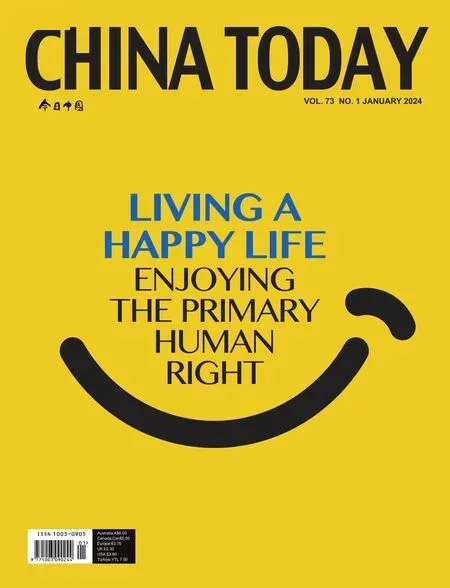BRI Cooperation for Realizing the Right to Development
By ZHOU LI
The BRI is not just a Chinese proposal for economic development,but also a platform for international cooperation and a global public good for realizing the right to development.
LAST year marked the 10th anniversary of the Belt and Road Initiative (BRI).Over the last decade,against the backdrop of a sluggish global economy and rising sentiment against globalization,the BRI has played an important role in advancing economic globalization,improving global governance,and boosting common prosperity.The initiative has generated more opportunities,resources,and conditions for participating countries,and facilitated the free flow of production factors,opening-up,and prosperity.More importantly,it highlights the importance of the right to development as it forms a new development approach—the principle of pursuing greater good,shared benefits,and global governance values,which aligns the initiative with the UN Declaration on the Right to Development and the 2030 Agenda for Sustainable Development.The BRI is not just a Chinese proposal for economic development,but also a platform for international cooperation and a global public good for realizing the right to development.
True Development

The Yixinou China-Europe train loaded with 110 TEUs of photovoltaic modules,daily necessities and other goods,departs from Jinhua,Zhejiang Province,headed for Budapest,Hungary,on November 21,2023.
Historically,development was interpreted as primarily an economic process with the rate of production outputs and wealth generation as the measurement metric.This is still the foundation of the dominant development models in the world.Such an interpretation overstresses the numerical value of economic growth,but ignores its moral obligations,including fair distribution of the results of economic growth,and advancement of individual rights and the entirety of human society.
This is “development without progress.” Such development is achieved at the expense of the interests of the majority of the people in their own countries or other countries.A development model based on a zero-sum logic where the benefits are only enjoyed by a selected few creates unsustainable inequality and injustice,ultimately leading to conflicts and even war.
In the wake of such development is a widening global wealth gap,worsening underlying inequality,and unprecedented social,economic,cultural,political,environmental,and climate crises.Faced with such an untenable situation,the international community has to reevaluate its understanding of development.
prosperity
“Only when countries develop together,can there be true development;only when countries prosper together,can there be true prosperity.”
Today,development is not merely an economic process revolving around production outputs and wealth creation;it should be viewed as a comprehensive economic,social,cultural,political,and ecological process in which everyone participates in the development and the results of development are distributed in a fair and just manner.It puts greater onus on the well-being of the people of all countries.
As Chinese President Xi Jinping stressed in his keynote speech at the opening ceremony of the Second United Nations Global Sustainable Transport Conference held in October 14,2021,“Only when countries develop together,can there be true development;only when countries prosper together,can there be true prosperity.”
The BRI cooperation highlights an approach to“true development.” It presumes respect for each country’s internal systems and cultural diversity.Development,as the central task,is viewed from the perspective of being mutually beneficial and peopleoriented.In such development,efforts are made to safeguard the rights to survival and development of people in emerging economies,and development resources are allocated in a more fair and effective manner.It proves that in today’s international cooperation,sharing can precede development.Mutually beneficial development on an equal footing is not only possible,but is becoming a reality.
BRI Cooperation Boosts the Right to Development
The BRI is open and inclusive,and is carried out on an equal footing.This provides a firm moral foundation for this new global development model.Such development is people-centered and aims to ensure that people in various countries gain access to better social conditions,fully participate in the development process,and have a fair share in the benefits of development.The underlying value of such development is to promote people’s right to development.The alignment of the BRI with the right to development can be seen in five aspects—the principle of respect for independence and noninterference in the affairs of other countries,peoplecentered development in a supportive,equitable environment,primary obligation assumed by the state,aim for good governance,and stressing holistic and well-balanced development.
The first is the principle of respect for independence and non-interference in other countries’affairs.The BRI cooperation upholds the five principles of peaceful coexistence.While recognizing each country’s sovereignty,it respects each country’s resource endowment,supports countries in following their chosen development path,making their own policies and setting out development priorities based on their respective national conditions.For example,when cooperating with African nations,China has been stressing that the cooperation should be suitable for African countries’ local conditions,attach no political strings,and generate mutually beneficial results.
Second,development should be people-centered in a supportive,equitable environment.China advocates people-oriented development.The ultimate goal of BRI cooperation is to create a harmonious,peaceful,and prosperous life for the people.In the meantime,the cooperation also seeks to address unilateralism,protectionism,humanitarian crises,and mounting anti-globalization sentiment.It is open to all countries across the world and complies with international rules.It pursues no closed cliques,nor geopolitical maneuvering,or winnertakes-all games.Instead,the BRI creates conditions which enable the benefits of development to be shared by the people to the greatest extent,fundamentally safeguarding people’s right to development.
Third,the state takes on the primary obligation of realizing people’s right to development.Initiated by China,the BRI’s implementation is a process to translate political promise into development practices.In carrying out the cooperation,the Chinese government,financial institutions,and stateowned enterprises have been acting as trailblazers.Domestically,BRI cooperation has been included in the development plans of provincial-level governments.Internationally,it aligns with the plans and initiatives of other countries as well as regional and international organizations.These include the UN,African Union,Association of Southeast Asian Nations,European Union,Eurasian Economic Union,and the Community of Latin American and Caribbean States.
benefits
BRl cooperation brings benefits to world peace,security,opening-up,and prosperity.
Fourth,BRI cooperation advances good governance.Enabling policy,infrastructure,trade,capital,and people-to-people connectivity,the BRI provides solutions to the two core problems for development—infrastructure and foreign trade.It seeks to facilitate good governance,as is seen in the more than 200 Belt and Road cooperation documents.They cover agreements,memorandums of understanding,action plans for cooperation or rules of procedure in such areas as infrastructure,international transportation,customs affairs,nuclear energy,water resources,and science and technology.There are also guidelines and sustainable analysis frameworks for financing and debts,as well as multi-sectoral indicators for monitoring changes and progress.
Fifth,the BRI stresses overall and balanced development.Coordinating domestic and international development,it aims to solve the problems hindering development at national and international levels.While advancing balanced development of economy and society,the cooperation is building a framework for the world to realize the free and orderly flow of production factors,efficient allocation of resources,and intensive integration of markets.China actively fulfills its obligations,respects other countries’ sovereignty and development capacity,increases political mutual trust and economic integration,and advances the protection of political,economic,cultural,and social rights.While realizing its own development,China shares its proposals,experiences,wisdom,and development opportunities with other participating countries.
An Important Global Public Good
BRI cooperation brings benefits to world peace,security,opening-up,and prosperity.It infuses new core values for globalization,demonstrating China’s wisdom and sense of responsibility and increasingly rising global influence.Progress brought about by this process—including domestic and international reform,alignment of policies,institutions and mechanisms,and improvements in infrastructure,finance,trade,technology,energy,transportation,and communication—fulfills the demand of the right to development.Due to this,it is winning widespread recognition from the international community.

Visitors at the“Belt and Road–The Bridge of Civilization”Books and Creative Cultural Product Exhibition in Beijing on September 28,2023.
As a global public good,the initiative also encourages all countries in the international community to participate.The rules are not set by China unilaterally;instead,all participating countries define the rules based on extensive consultation.
When providing global public goods,some countries may attach conditions for their own national interests or values.The BRI,however,provides a cooperation platform and market network for common development.Unilaterally-dominated proposals are not the path followed in the BRI;rules are devised and improved in the interest of equal cooperation.National interests are integrated into the design and fabric of this public good.Such cooperation not only mobilizes the strengths of participating emerging economies,but also promotes dialogues and exchanges between developed countries and developing nations.The BRI is so far the most popular global public good and the platform for international cooperation with the brightest prospects.
BRI cooperation solves problems facing global governance.With multilateral cooperation,partnerships,and integrated development as the basis,it relies not only on traditional trade and investment,but also large-scale infrastructure construction.Underpinned by the principle of the right to development,it creates new conditions,optimizes allocation of resources,wealth,and income distribution,balances the way of distribution,provides a fresh moral foundation for economic development,and spurs comparative advantages among countries.In the meantime,it also enables developing countries to have a greater say in world affairs.Emerging markets are seeing their share in the global economy increasing,but their right to have a say is not commensurate with their economic strengths.The new type of economic globalization China is pursuing will provide opportunities for sustainable economic development for itself and all other participating countries.It will also make the international economic order more fair and just.

